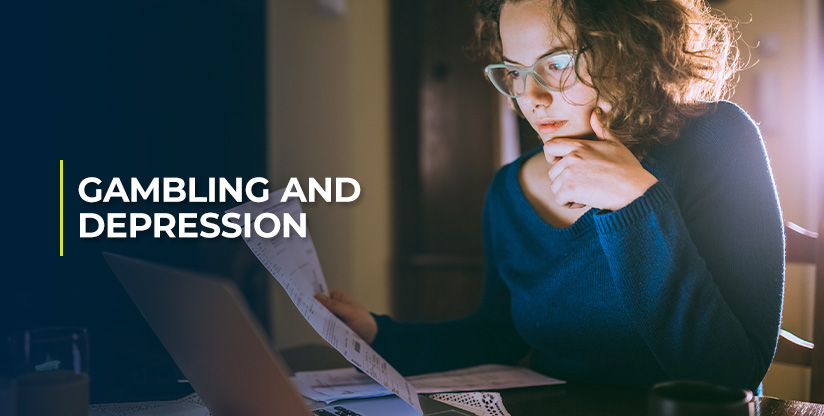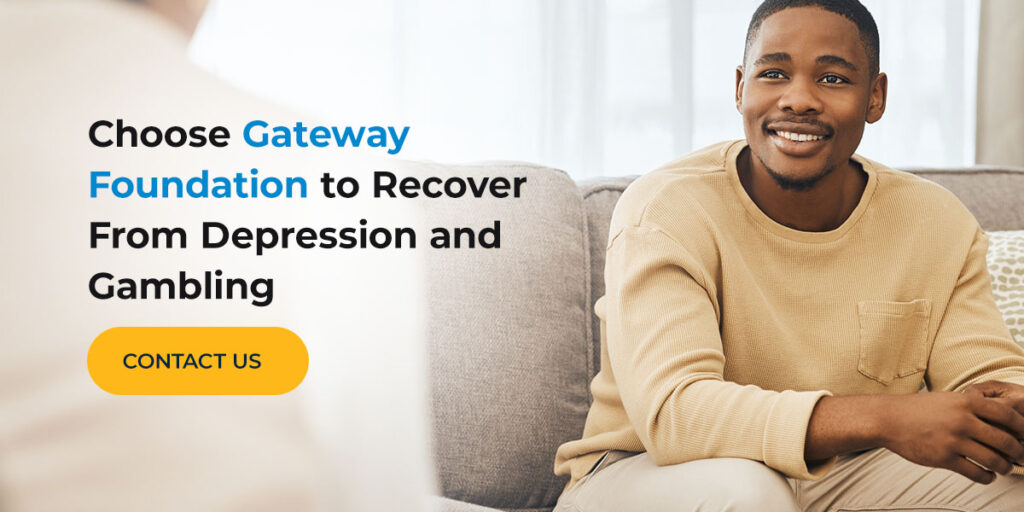- Jul 21
- Mental Health Treatment

Depression and gambling can affect people from all walks of life, regardless of age, sex, race or income. Depression and gambling problems can impact a person’s life to the point where it’s challenging to carry out the most basic tasks, and they can have devastating effects on your relationships or your ability to work or go to school.
It’s essential to consider depression and gambling when seeking treatment since each intensifies the symptoms and severity of the other. If you’re depressed, you may be using gambling to improve your mood or push away your uncomfortable feelings. The thought of winning when gambling can seem like an easy solution, but it can quickly become an addiction. Below, you’ll learn more about gambling and depression and how these two problems coexist with one another.
The Relationship Between Gambling and Depression
Problem gambling and depression have a well-documented history, and these problems or disorders often co-occur. People who experience depression experience a wide range of symptoms, including:
- Loss of interest in activities you once enjoyed
- Social isolation, irritability or restlessness
- Feeling like you’re worthless or experiencing self-loathing
- Having a hopeless outlook on life
- Impacted appetite and sleep
- Weight changes
- Challenges controlling emotions or actions
While people may feel down occasionally, depression is a consistent feeling that can harm a person’s life. People with depression may also show signs of self-harm or may experience suicidal ideation.
Experiencing depression symptoms can cause a person to seek out activities to escape from their reality, even if they’re reckless. One of these activities can include gambling. Gambling and depression statistics show that people with more severe depression symptoms are more likely to engage in gambling behaviors as an escape or attempt to experience the highs of gambling. A person’s inability to control their emotions or actions can make them more likely to experiment with gambling until they become addicted to chasing a win. Certain disorders are considered to be a risk for gambling addiction.
Alternatively, gambling can cause depression. If a person becomes addicted to gambling, they can easily experience depression symptoms. Losing money, causing tension in personal relationships and suffering other negative consequences of gambling can cause a person to feel depressed or hopeless about their situation, which can turn into a vicious cycle. A person may continue to gamble, hoping their luck will change, which can result in more negative consequences and worsen their depression symptoms. Combining gambling, alcohol and depression can worsen symptoms and more severe addiction.
Questions to Ask Yourself or a Loved One
People who gamble because of their depression can worsen their symptoms if they don’t get the results they expected with their gambling. Gambling while experiencing depression symptoms or emotional turmoil can reinforce the idea that gambling makes you feel better until it spirals into an addiction. You can ask yourself or a loved one the following questions to determine whether there’s an emotional reliance on gambling, an addiction and whether professional intervention is necessary:
- Do you have a poor emotional state when you’re not gambling, such as intense depression symptoms, stress or anxiety?
- Do you feel like gambling offers you something or relief you can’t find elsewhere?
- Do you usually gamble when you’re feeling good or feeling down?
- Does gambling offer you an emotional escape from the feelings you experience throughout the day?
Look carefully at your or your loved ones’ answers — the responses to these questions can indicate that they are using gambling as a way to cope with uncomfortable feelings and symptoms, such as restlessness, thoughts of self-harm, loneliness or apathy. Using gambling as a way to cope indicates the need for professional help to find more effective ways to handle symptoms and feelings, which can include therapy and coping skills development.
How to Cope With Depression Without Gambling
If you have depression and use gambling to cope, there are steps you can take right now to help you improve your well-being and eliminate risk-taking behaviors. Some techniques you can try include:
1. Creating a Schedule
People who have depression often feel unproductive or unmotivated, which can cause them to turn to activities like gambling to boost their mood and try to reclaim their productivity and motivation. Creating a schedule can help you feel more in control of your day while generating a sense of purpose. Some examples of things to include in an effective schedule to deal with depression include:
- Waking up at a designated time each morning
- Cooking breakfast to get a healthy start to your day
- Going to work or school
- Time for cleaning or chores, broken up into manageable tasks throughout the day
- Time for relaxation and healthy activities or hobbies
- Cooking a healthy dinner
- Going to bed at a designated time to get enough sleep throughout the night
Your schedule may vary from day to day based on your responsibilities — if you work throughout the week, you can fill your weekend schedule with activities you enjoy, such as cooking, writing, painting, exercising, hiking or any other healthy activity that makes you feel joy. You can be as flexible with your schedule as you want, whether you want to break everything down by hour or create a list of tasks to complete and take them at your own pace.
2. Getting Plenty of Sleep
People who struggle with depression often struggle with sleep disturbances, such as:
- Insomnia
- Hypersomnia
- Sleep apnea
- Nightmares
- Sleepwalking
Getting plenty of sleep each night can help offset some of the symptoms of depression. Aim for an average of eight hours of sleep each night. If you struggle with a sleep disturbance or disorder that makes it difficult to wake up rested — such as sleep apnea or nightmares — a medical professional can help you find better ways to manage these problems and get enough restorative sleep to function and take your symptoms on head first.
3. Staying Connected With Your Loved Ones
Some people experiencing depression symptoms intentionally or accidentally distance themselves from loved ones. This could worsen that individual’s symptoms since they can experience isolation, loneliness and a lack of support. Prioritize connecting with your friends or family, even for just a few minutes. Some ways you do this include:
- Communicating through social media, text or video chat
- Assigning time in the day to call
- Scheduling regular meet-ups
- Engaging through shared interests and hobbies, such as gaming or movies
- Reaching out to someone you trust when you feel down
Making a habit of spending time with loved ones could help improve your disposition or alleviate some symptoms. You can also engage in nurturing activities with those you love to help break free from a gambling addiction and find healthy, fulfilling ways to cope with uncomfortable feelings.
4. Eating a Balanced Diet
Your depression symptoms can feel worse if your diet lacks proper nutrients or you don’t eat often enough — your body will feel more fatigued, and you may feel more stressed. You might be more tired throughout the day and unmotivated to make changes due to a lack of physical stamina and mental energy.

Eating a balanced diet appropriate for your age and health needs can help improve your overall well-being and uplift your confidence. Try eating three healthy meals daily and listening to your body’s hunger cues between meals. Have healthy snacks that you enjoy eating nearby to ensure you get enough food and nutrients.
You can also seek help from a registered dietitian or a similar professional if you have trouble establishing a supportive meal plan. Pre-making meals and storing them for later can also help you eat a more balanced diet since there may be times you feel less motivated to prepare something fresh.
5. Engaging in Physical Activities You Enjoy
Physical activities like exercise or playing sports can help you relieve stress and boost your mood by releasing endorphins. You may like to work out or exercise, but you may also be someone who doesn’t find these activities enjoyable. Instead, you can find physical activities that bring you joy while engaging your body, such as:
- Yoga
- Dancing
- Hiking
- Biking
- Pilates
You can also play sports if you find it more engaging. Sports — like football, soccer, volleyball and basketball — are a great way to connect with others and increase your motivation since you’re part of a team and community.
6. Picking Up a New Hobby
You can replace gambling with a hobby that you enjoy or one that makes you feel more productive throughout the day. If there’s something you’ve always wanted to try, now is the perfect opportunity to pursue it. Examples of hobbies you can try include:
- Cooking or baking
- Painting or other arts
- Woodworking or refurbishing
- Furniture flipping
- Gardening
- Reading and writing
- Photography
- Blogging or journaling
Healthy hobbies can be a fun, effective way to improve your mood without the negative consequences associated with gambling and other addictions. These activities help you connect with yourself and others and are a reliable and fulfilling way to manage depression symptoms.
7. Joining a Support Group
Joining a support group can help you engage with others who understand what you’re experiencing. Use support group meetings as an opportunity to find out how others with depression or gambling problems cope. You’ll also have the chance to share your own experiences, and you won’t have to worry about judgment since your peers will understand what you’re facing and feeling.
Look for a group led by a professional addiction or mental health counselor for optimal support. The group you choose should be focused on gambling, depression or both so you get help for your specific challenges and can find coping tactics that apply to your unique situation. You can usually find support groups by contacting an addiction treatment center in your area, but you can also perform a Google search to see all the support groups in your area.
8. Talking With a Professional
If you’re struggling to find healthy ways to cope, you can talk with a professional who treats depression and gambling addiction. They can help you get to the root cause and offer you treatment options to help you recover. A professional can also help you find healthy coping mechanisms personalized to your life and needs.

Choose Gateway Foundation to Recover From Depression and Gambling
Gateway Foundation is ready to help people like you overcome depression and gambling addictions. We know the power these addictions can have, and our programs are curated to help you regain control so you can feel happier and more fulfilled. Our depression and gambling addiction programs can help you improve your quality of life. We’ll customize a treatment that fits your needs and goals while getting to the root cause of your addiction instead of just putting a bandage over the real problem.
Your customized plan is designed to meet your needs and empower you to find healthy coping mechanisms to overcome depression symptoms and overcome any gambling compulsions. Contact us today to see how we can help you change your life and develop sustainable skills for managing symptoms.


